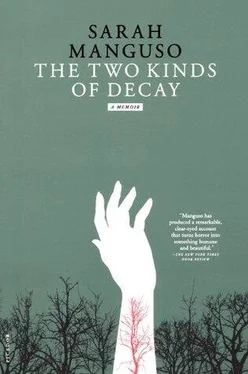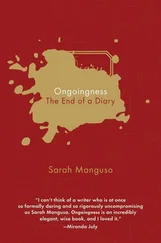Once in my life I promised to say a prayer for my Catholic grandmother.
I picked up the phone when she called one morning at seven o’clock. She begged me to come and visit her. She said she was lonely. She was eighty-three years old and her friends were dead. I said I would visit if I didn’t have to go to school. I was in the seventh grade. She said, Oh, school. Then she thought for a moment and said, Say a prayer for me.
I was self-conscious generally, and prayer embarrassed me. I had learned phonetic Hebrew and had been taught Hebrew prayers, which, to me, were just a sequence of sounds, but I didn’t know how to pray in English.
After my grandmother’s death I remembered my promise and felt sad, but less about my grandmother than about the idea of a young person promising to say a prayer for an old person and then forgetting to do it during the old person’s lifetime.
Twelve years later, in the psychiatric ward, I was eating crackers in the kitchen when two other patients sat down with me.
One woman was my age. She was schizophrenic and had spent her first few days in the dayroom, standing, holding a Bible, reading loudly and clearly, and sometimes singing in a pure soprano.
The nurses asked her to stop. Later she explained, I just wanted to bring the Lord into this place.
The other woman was poor and had a very ill son who lived in a state home. Like many of the patients, she chewed nicotinelaced gum, because smoking on the ward was prohibited. And like all of us, she had no pretensions of superiority to anyone else committed to the ward.
She asked me, Do I seem depressed? I looked at her desperate, ruined face, and answered with careful solemnity, Maybe a little.
The ward was the only true community of equals I have ever lived in. What I mean is that we all knew we had already lived through hell, that our lives were already over, and all we had was the final descent. The only thing to do on the way down was to radiate mercy.
The singing schizophrenic, the sad mother, and I sat quietly for a few minutes, and then the schizophrenic asked, Would you like to pray with me?
The two women and I joined hands. One of them spoke for a while and then stopped. Then the other spoke. They addressed God humbly and directly.
One said, Please take care of my friends Nico and Sarah, and help us leave this place.
Then she said, I love you, Jesus.
I hadn’t ever heard my Catholic grandmother speak to her Lord like that. And the rabbi at my synagogue never seemed to want much to do with a heavenly God.
The schizophrenic was allowed to leave before I was. Her parents came to get her and seemed terribly ashamed. But to me she seemed no more or less joyful, no more or less insane, than on the day she’d arrived and first sung in the dayroom.
The only changes I noticed in her were what looked like painful muscle spasms from her antipsychotic medication, of which she now took a higher dose.
I awoke on my first Sunday on the psych ward to find a roommate. She was Japanese and she didn’t speak. In one hand she held a slip of paper with some sentences printed on it in pencil. One of them, I read later, was I understand I need to talk for discharge but I don’t like to talk when I have pain in my heart. She held up the paper while she sat in a chair, folded almost in half.
Her face and neck were blue.
What I mean is that she had come in during the night and found the whiteboard and the sweet-smelling blue marker we used to write down each other’s phone messages, if anyone called, and if we could remember what to write, and if we remembered it’s a good thing to be seen doing if we wanted outdoor privileges.
Kimiko found the marker and — I was not there, I am only filling in the narrative based on the part I could see — her desolation was so total that the only relief she saw was to scrub her face out with the blue marker. Her whole neck and most of her face: small blue vertical scrub marks.
The doctor was explaining that she had to wash it before she’d be allowed to participate in Group. I wondered what this doctor understood and hoped it was something, because I am not a doctor and I understood Kimiko needed to have a blue face.
Also she would not put on any clothes. The doctor seemed not to understand a person can be too sad to wear clothes. I asked the doctor to go away.
Kimiko wasn’t allowed food unless she left our room, so she sat in the corner of the dayroom all day, naked and wrapped in a sheet, her blue face visible under her white hood.
My parents visited. That Sunday was the day of an important football game, and my father sat in the dayroom with the other mental patients and watched it. While he was there Ed the psychotic came out of his room in hospital pajamas and asked Betty, a near-catatonic depressive, what she was going to be for Halloween, since it was only a week away. Ed said, I’m going as a mental patient. He’d been on electroconvulsive therapy and Haldol since 1976.
On Monday Kimiko had ECT and on Tuesday declared she felt better. Her husband was a scientist in the States on a fellowship. I got her to teach me how to say I am not insane in Japanese: wa-ta-shi-wa ku-ru-tte i-nai.
By Saturday, still on the psych ward, I could feel my hands were weaker, but Darlene said my walking looked the same, no worse.
Darlene was sixty, very skinny, a long-haul anorectic. Did jigsaw puzzles ten hours a day and was thoroughly sweet to everyone, even Betty, who dozed in the dayroom and smelled.
Sam the bulimic told me about Darlene’s repeated suicide attempts — the eating disorders trusted each other. We both smiled. Darlene knew what she was doing.
That night we all stayed up playing poker with candy for chips. It was Edith’s first game of poker. She was an old lady whose antique shop had burned down. I taught everyone Texas Hold ‘Em. We’d all taken our meds before starting and had to quit after the fourth hand.
My second Sunday on the psych ward was Halloween. We decorated the ward with spiderweb floss. Sam had three trays of pastries sent from his shop. The therapist from South Dakota danced a jig. Ed and Nico danced cheek to cheek. Darlene sang “Crocodile Rock.” Edith recited a Yeats poem.
On Monday, in art therapy, I glazed my trivet, a square of plaster set in metal, with rows of tiny heart-shaped tiles set in the plaster.
After four days on the ward, I was allowed to sign out for a chaperoned walk around the parking lot. Three days after that, I signed out on a day pass. My parents came to get me and drove me to the computer store because I believed every document on my hard drive would self-destruct on New Year’s Day. I spent my day pass loading new software and manually reopening and resaving each one of my files.
That night I went back to the ward feeling good about my successful day off from lockdown. I’d avoided unhealthy behavior, as long as I didn’t count the obsessive reformatting of hundreds of digital text files. My success earned me the right to ask to be released.
I left the psych ward a few days after Halloween.
Instead of going home, though, I had to go to the other hospital, the one where I’d spent so much of the mid-1990s, because my severe depression, which I’d mistaken for a CIDP relapse, had triggered a CIDP relapse.
In the twelve years since my diagnosis I have not owned a home or a car, or had any job that wasn’t temporary, or married or lived with anyone.
Читать дальше












